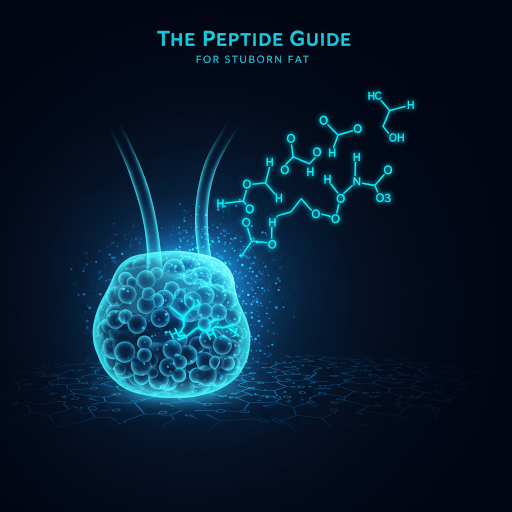You’ve done everything right. You’ve been disciplined with your diet, consistent with your workouts, and committed to your health goals. Yet, the scale refuses to move. That frustrating plateau isn’t a sign of failure or a lack of willpower. For many, it’s a sign of a deeper biological challenge: weight loss resistance. This is where your body, for metabolic or hormonal reasons, actively fights your efforts to lose fat.
But what if you could use a medically guided strategy to break this stalemate? Peptide therapy represents a sophisticated, targeted approach to overcoming the very root causes of weight loss resistance. At Philly Wellness Center, our team, led by Dr. Catie Harris, specializes in creating physician-led peptide protocols that act as a key to unlock your body’s fat-loss potential. This article is your roadmap to understanding how these innovative therapies work, who they are for, and how a safe, personalized plan can help you finally achieve the results you’ve worked so hard for.
Why traditional weight loss fails: understanding metabolic and hormonal resistance
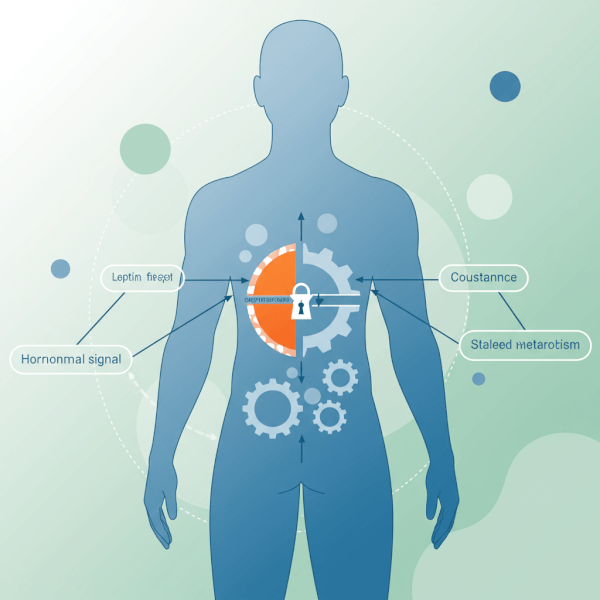
For many people, the body’s survival mechanisms can unfortunately work against their weight loss goals. After an initial period of success, the body may perceive significant weight loss as a threat, triggering powerful countermeasures that create a frustrating plateau. This isn’t a personal failing; it’s a biological reality.
This phenomenon is driven by two key factors:
- Metabolic resistance: As you consume fewer calories, your body’s metabolism can slow down dramatically to conserve energy. It’s like your body’s thermostat is set incorrectly; it dials down its energy expenditure to match the lower intake, halting further weight loss even when you’re maintaining a strict caloric deficit.
- Hormonal resistance: Your body relies on a complex network of hormones to regulate fat storage and appetite. When these signals stop working correctly, weight loss becomes nearly impossible. Key examples include insulin resistance, where your cells can no longer efficiently use glucose for energy, promoting fat storage, and leptin resistance, where the brain no longer properly receives the signal that you are full.
As Dr. Catie Harris, a longevity expert with over two decades of clinical experience, notes, “During an initial consultation, my first goal is to listen to the patient’s story. When they describe stalled progress despite immense effort, it points us toward investigating these resistance patterns. We then use targeted diagnostics to see if it’s a metabolic slowdown or a hormonal signaling issue, which tells us precisely where to intervene.”
Peptides work by directly interacting with these specific biological pathways, which is why they can succeed where traditional methods often fall short.
Matching the peptide to the problem: a guide to the primary solutions
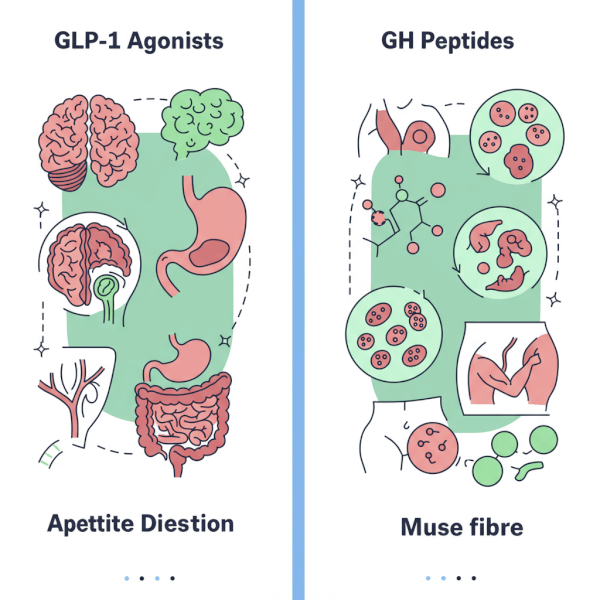
There is no single “best” peptide for weight loss. The most effective treatment depends entirely on your unique physiology, the specific type of resistance you’re facing, and your ultimate goals. A medically supervised plan is designed to match the right tool to the right problem.
For overall resistance and appetite control: GLP-1 agonists
GLP-1 (glucagon-like peptide-1) receptor agonists are some of the most well-known and powerful peptides for weight management. These medications, which include Semaglutide and Tirzepatide, work by mimicking the effects of natural gut hormones called incretins. They tackle weight loss resistance on multiple fronts by regulating blood sugar, slowing down how quickly your stomach empties to prolong feelings of fullness, and acting on the brain’s hunger centers to powerfully reduce appetite and cravings.
- Ideal candidate: Someone struggling with a powerful appetite, general weight loss resistance, and potential signs of blood sugar imbalance or insulin resistance.
- Evidence: The effectiveness of these peptides is well-documented. A comprehensive scientific review of Semaglutide published by the National Center for Biotechnology Information (NCBI) confirms its significant impact on weight management in clinical settings.
For stubborn visceral fat: targeted growth hormone peptides
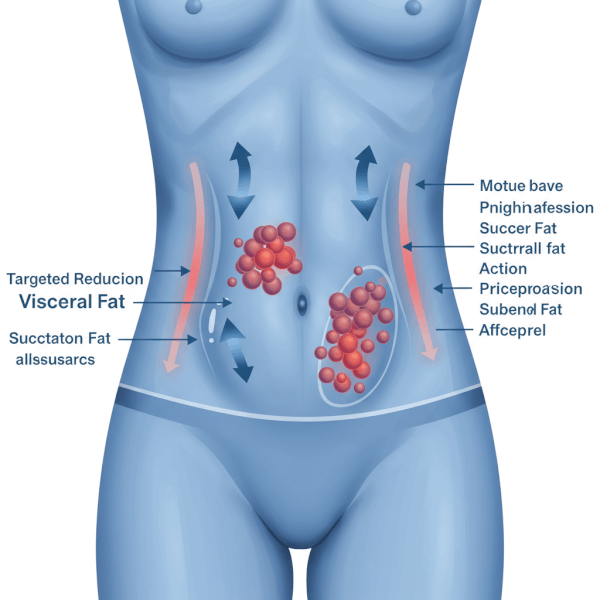
One of the most common frustrations is stubborn belly fat, also known as visceral fat. This type of fat, which surrounds your internal organs, isn’t just a cosmetic concern—it’s metabolically active and is linked to serious health risks. Peptides like Tesamorelin and AOD-9604 are specifically designed to address this. They work by stimulating your pituitary gland to release growth hormone (GH), which has been shown to preferentially target and break down fat cells, particularly stubborn visceral fat.
- Ideal candidate: Someone who may have already lost some weight but is struggling to reduce persistent abdominal fat and improve their body composition.
- Evidence: A clinical trial published in JAMA and available via PubMed highlights the specific effects of this peptide, with research on Tesamorelin for visceral fat demonstrating its ability to significantly reduce this dangerous fat accumulation.
For body recomposition: peptide stacks to build muscle and burn fat
A major downside of traditional dieting is the loss of lean muscle mass along with fat. This is detrimental because muscle is metabolically active; the more you have, the more calories you burn at rest. Losing it can lower your metabolic rate, making long-term weight maintenance more difficult. Peptide stacks like CJC-1295/Ipamorelin are designed to counter this. They stimulate a more natural, pulsed release of growth hormone that not only aids in fat loss but also helps preserve and even build lean muscle.
- Ideal candidate: Someone focused on improving their overall body composition and metabolic health, not just seeing a lower number on the scale.
Peptide comparison: GLP-1 agonists vs. growth hormone peptides at a glance
| Feature | GLP-1 Agonists (e.g., Semaglutide) | GH Peptides (e.g., Tesamorelin, CJC-1295) |
|---|---|---|
| Primary Goal | Appetite Suppression & Blood Sugar Control | Targeted Fat Loss & Muscle Preservation |
| Best For | Overcoming general weight loss resistance | Targeting stubborn visceral fat, body recomposition |
| Mechanism | Mimics gut hormones (incretins) | Stimulates natural growth hormone release |
| Example | Wegovy, Zepbound, Compounded Semaglutide | Tesamorelin, CJC-1295/Ipamorelin |
The Philly Wellness Center protocol: your physician-led path to success
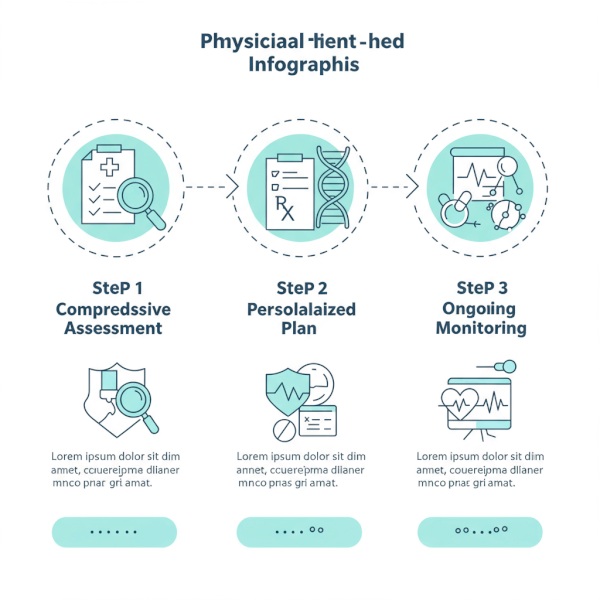
Knowing which peptide might be right for you is one thing; using it safely and effectively is another. This is where a structured, physician-led protocol becomes essential. “Attempting to source peptides online and self-administer is incredibly risky. You have no guarantee of the product’s purity, dosage, or even its identity,” warns Dr. Harris. “A comprehensive, medically-supervised program isn’t just about getting a prescription; it’s about creating a holistic strategy that ensures safety, maximizes results, and gives you the expert guidance needed for long-term success.”
Our protocol is designed to provide a clear, safe, and supportive path from start to finish.
Step 1: Comprehensive consultation and metabolic assessment
Your journey begins with an in-depth consultation with one of our medical experts. We go beyond the surface to review your complete health history, discuss your past weight loss struggles and successes, and clearly define your goals. This may involve advanced diagnostics to get a precise picture of your metabolic and hormonal health, allowing us to identify the true root cause of your resistance.
Step 2: Creating your personalized peptide and lifestyle plan
Based on your assessment, we design a fully personalized plan. This involves selecting the precise peptide or peptide stack best suited to address your biological needs. But the prescription is only one piece of the puzzle. We integrate the therapy into a holistic plan that includes tailored nutrition and exercise guidance to support the peptides’ effects and help you build sustainable, healthy habits.
Step 3: Ongoing monitoring for safety and results
Your safety and success are our top priorities. We schedule regular follow-up appointments to closely monitor your progress, manage and mitigate any potential side effects, and make adjustments to your protocol as needed. This continuous oversight ensures the therapy remains effective and safe throughout your journey, countering the risks and fears associated with unmonitored use.
Answering your top questions about weight loss peptide therapy
Are weight loss peptides safe?
Yes, weight loss peptides are safe and effective when they are prescribed by and monitored by a qualified medical professional who sources them from a reputable, licensed compounding pharmacy. The primary danger comes from unregulated online sources. Due to the risk of counterfeit, contaminated, or incorrectly dosed products, there are clear FDA safety warnings on weight loss peptides sourced outside of legitimate healthcare channels. A physician-led program eliminates these risks.
What are the common side effects of weight loss peptides?
The most common side effects, particularly for GLP-1 agonists like Semaglutide, are gastrointestinal and may include nausea, constipation, or diarrhea. These side effects are typically mild, temporary, and effectively managed by following a medical protocol that starts with a low dose and gradually titrates up as your body adjusts. Other peptides, like those that stimulate growth hormone, may have different side effect profiles, such as flushing or vivid dreams, reinforcing the need for expert medical guidance.
How quickly will I see results from peptide therapy?
While some effects like appetite suppression can be felt very quickly, noticeable weight loss typically occurs over several weeks to months. It’s important to have realistic expectations. Peptides are a powerful medical therapy, not an overnight fix. They work best and provide the most sustainable outcomes when viewed as a catalyst for change within a comprehensive lifestyle program.
What happens when I stop taking weight loss peptides?
If lifestyle changes related to nutrition and exercise are not adopted during the therapy, it is possible to regain some or all of the lost weight after stopping. This was a key finding in a major clinical trial on Tirzepatide for weight loss maintenance published in JAMA. The goal is to use the peptide as a powerful tool that makes it easier to build the sustainable habits necessary for long-term success. Your physician will work with you to develop a strategy for maintaining your results, which may include maintenance protocols or cycling strategies.
Your personalized roadmap to lasting success
Weight loss resistance is a real biological challenge, not a personal failing. Peptides offer a targeted, science-backed solution to overcome these hurdles by working with your body’s systems, not against them. However, they are a sophisticated medical tool, not a magic bullet.
The key to unlocking their full potential lies in a personalized, medically supervised protocol that matches the right peptide to your specific needs and integrates it into a holistic lifestyle plan. This approach ensures safety, maximizes effectiveness, and empowers you to finally take control of your metabolic health for good.
If you’re ready to move beyond frustrating plateaus and explore a personalized strategy for weight loss, the experts at Philly Wellness Center are here to guide you.
Schedule your initial consultation today to discover if peptide therapy is the right solution for you.
